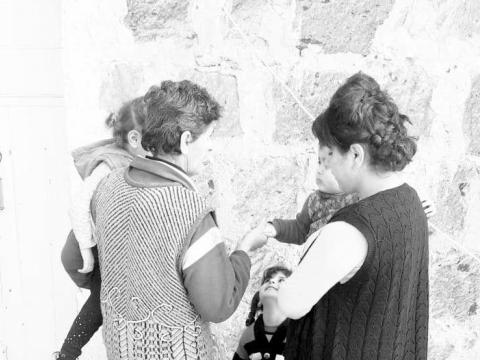A community, that stands by every family

Four-year-old Karine, three-year-old Anush, and one-year-old Grigor[1] live with their mother and grandma. The family has only recently moved to Mrgashat Community in Armavir Region. The children’s father Armen died after a heart attack in 2018. One-year-old Grigor was born after the death of the father. Before Armen’s death, the family used to live in Ararat. After he passed away, the mother Anna together with her three children and mother-in-law landed on the street as her husband's brother threw them out of the house. The family did not have a choice but to move to the mother’s paternal home in Mrgashat, where her parents lived together with her brother, the latter’s family and his four children. Anna’s parents were also in need, living on the edge of poverty, and it was impossible for the family to settle there. After moving to Mrgashat, the family was left out of the state support system. Kids were isolated, did not interact with their peers, and did not attend kindergarten due to the community change.
Within the scope of “Community Level Access to Social Services (CLASS)” project, funded by the United States Agency for International Development (USAID) and implemented by World Vision and Child Development Foundation (CDF), the social worker of Mrgashat Community, in cooperation with the Social Assistance Territorial Department (SATD) case manager and with the supervision of CLASS regional coordinator, began working with the family, conducting a comprehensive needs assessment. In line with the Individual Social Program, an intervention plan was developed based on the family’s most urgent needs. Family’s resources and opportunities were explored, the issue of basic housing was resolved.
CLASS implements the strategy of Graduation Approach, which is a multi-sector intervention supporting the most vulnerable families. The principle of this approach is to not only assess the families based on their most urgent needs but to also evaluate and understand their capacities and resources, take out the existing potential upon which the economic resilience of the family should be built.
A temporary shelter was provided to the family by Mrgashat Community, where Anna currently lives with her three children and her mother-in-law. The family was also given a plot of land, which Anna cultivates and is able to provide some food for the family.
The acquisition of certain property was also a significant event in the family’s life. Mrgashat Community has allocated a certain amount of money from the community budget to obtain the necessary household items for the family including furniture and any other essential property.
With the assistance and guidance of the community social worker the registration issue of the family was resolved, the state allowance was restored.
With the support of the Mrgashat Community, the employment issue of the grandma was also resolved. She was involved in the seasonal work of the community.
As a result of the collaboration with the community’s preschool facility, Karine and Anush now attend kindergarten.
The family was included in the “Humanitarian aid” program implemented by Child Development Foundation.
As a result of the implemented interventions, the family now has a basic shelter and some stable income. The family is aware that they are always in the spotlight, no longer alone, and supported by the community, state, and social institutions.
“We never knew what municipality was, how it could share the burdens of a family, and that there was an employee (social worker) who could provide the right solutions to our problems. It was unbelievable that one day we could put our heads on the pillow without thinking about whose house we would be sleeping in tomorrow”;- says the grandma.
The community social work supports the activation, organization, and expansion of the community capacities and helps communities become economically strong, resilient and self-sufficient. Thus, the role of the community is crucial as it serves as a pillar of support for the families in need.
Since 2017, thanks to the USAID funded “CLASS” project, community-based social workers were established enhancing the communities’ ability to identify, prevent and address their social issues. The social case management process, which starts with the comprehensive needs assessment followed by the development of intervention plan, has been applied and implemented in Mrgashat Community resulting in targeted support of more than 18 families.
[1] Due to the nature of the content, names and identifying details have been changed to protect the privacy of individuals.